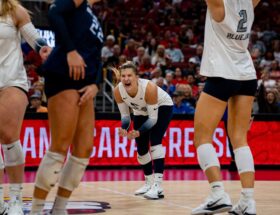Breaking Through the Pain

From Hurt to Heart: How Kendal Murphy Transformed Struggles Into Strength on and off the court! —
*Disclaimer Topics: Depression, Medication, and Therapy*
Kendal Murphy’s story isn’t just about volleyball—it’s about resilience, vulnerability, and the strength found in embracing one’s true self.
Her story begins not on the volleyball court, but in the quiet moments of her youth, when her body first betrayed her in ways she couldn’t understand. It’s a journey marked by illness, heartbreak, and ultimately, an incredible transformation that helped her find strength not only as an athlete but as a person.
A Life in the Game
From a young age, Kendal was immersed in the world of volleyball. “I grew up in the ball cart,” she recalls, watching her parents coach and learning the game from the sidelines. This early exposure ignited a passion that would define her life.
A Diagnosis That Changed Everything
At just 13 years old, Kendal’s life was turned upside down when she was diagnosed with hyperthyroidism, a condition that caused her body to function in overdrive. “I was always the top player, the one everyone could count on,” Kendal remembers. “But suddenly, everything felt wrong. I started losing weight, my hair began falling out, and I was constantly exhausted.”
Kendal’s body was producing hormones improperly… she was producing too many. Due to this, she began to lose muscle mass, dropping 20 pounds without understanding why. “I had no idea what was going on with me,” she says. “I didn’t even know what it meant to have hyperthyroidism. I just knew I wasn’t feeling like myself.”
Her coaches, unaware of the deeper issue, attributed her struggles to a lack of conditioning. “They said I wasn’t in shape. My parents didn’t know what was happening either. It was like I was fighting something alone, even though I didn’t fully understand it.”
Eventually, after a concerned coach noticed her weight loss and overall decline in energy, Kendal’s parents sought medical help. The diagnosis came as a shock—her thyroid was working overtime, speeding up her metabolism and causing a cascade of health issues. “I had to wear a heart monitor during a tournament because my heart rate was so fast, it could have caused a heart attack,” she recalls. “It was terrifying, and I couldn’t play the way I used to.”
The Silent Battle of Mental Health
While her physical health was failing, Kendal’s mental health was starting to show cracks as well. “I felt like something was wrong, but I didn’t know how to explain it,” she says. “I was struggling inside, but no one could see it.”
Kendal’s depression started to take hold during a difficult breakup in high school, one that intensified an underlying sadness she had never addressed. “I just couldn’t shake the sadness. It lingered and grew,” she shares. “It was like the more I tried to ignore it, the worse it got.”
At first, Kendal tried to deal with her emotions on her own. As a high-performing athlete, she thought she could push through anything. “I would push my feelings down, just like I pushed through physical pain on the court. I thought I could handle it like an athlete handles an injury—by ignoring it and pushing through.”
But this tactic only made things worse. The breakup, combined with her growing emotional distress, spiraled into depression. “I just couldn’t get out of bed. I was crying all the time, and I stopped eating. I felt like I was losing control of everything.”
Eventually, Kendal reached out for help, something she had never done before. “I told my parents I wasn’t okay,” she admits. “I was scared to admit it, but I knew I had to.” This decision to seek therapy and medication marked a turning point in Kendal’s mental health journey. “Asking for help is a strength, not a weakness,” she reflects now, understanding the importance of leaning on others.
But despite the guidance she received, Kendal’s journey was far from simple. After a few months on medication and seeing a therapist, she thought she had it under control. “I stopped taking my antidepressants, stopped going to therapy. I didn’t tell anyone,” she says. “I wanted to handle it myself. I thought I could just fix it. But that only made things worse. I started partying, sneaking out, doing things I wouldn’t normally do.”
It was only after another deep struggle that Kendal came clean. “I told my parents I hadn’t been taking my medication or seeing my therapist. And they were like, ‘Why didn’t you tell us sooner?’ That’s when I realized that not asking for help had made everything harder.”
The College Struggle: Pushing Through Pain
Kendal’s struggles didn’t end with mental health. As she entered college at Baylor, her physical pain resurfaced in the form of a shoulder injury that had been nagging her since high school. “I had torn my labrum and been playing through it for years,” she recalls. “Freshman year, I just tried to ignore it. I didn’t want to admit how bad it was. But the pain was real. And it was only getting worse.”
As her freshman year unfolded, the injury became harder to hide. “My coach kept telling me to hit harder, but I was in so much pain. I was afraid if I slowed down or didn’t give it my all, I wouldn’t make it,” she explains. “I developed an alter ego on the court. The pain would go numb. I would focus on what I needed to do and push through.”
But the mental toll of playing through this injury began to weigh on Kendal. “The mental side of the injury was what sucked the most. I couldn’t even serve properly without feeling pain,” she admits. “The hardest part wasn’t the physical pain—it was the frustration of not being able to do what I knew I was capable of.”
By sophomore year, Kendal’s labrum tear had worsened, and the pain became nearly unbearable. “I would take an insane amount of ibuprofen and Tylenol just to get through practice,” she shares. “But I couldn’t hide the pain anymore. I had to get surgery, and I had to push for it, because no one else understood how much pain I was in.”
Filled with a love for the game and dedication to her team, Kendall pushed through her sophomore season as a full-time outside hitter. Leading the team despite the constant pain. She competed through every match, determined not to let her injury hold her back. However, eventually, she realized that continuing to play in that condition was no longer sustainable, and she knew it was time to seek the medical help she desperately needed.
Despite facing resistance from her medical team, Kendal fought for the surgery she knew she needed. “They didn’t believe me at first. They said physical therapy would help, but it didn’t. I knew I wasn’t fine,” she says. “I had to listen to my body and push for what I knew was right for me.”
Finding Strength Through Struggle
Looking back, Kendal reflects on the long road of physical and emotional struggles that brought her to where she is now. “I’ve learned that you have to put yourself first,” she says, her voice steady with newfound confidence. “If you’re not okay, you can’t help anyone else. And you can’t keep pushing through pain, whether it’s physical or emotional, without addressing it.”
Kendal’s journey has shaped her into a leader who advocates for herself and others. “I’m not perfect, and I’m okay with that,” she says. “I’ve learned that being vulnerable is a strength. Sharing my story has allowed me to connect with others in ways I never thought possible.”
Her story is one of growth—physically, mentally, and emotionally. Kendal now advocates for self-care, for asking for help, and for listening to your body. “This is the only body I have,” she says. “And I’m going to take care of it the best I can.”
A Lesson for Us All
Through her illness, heartbreak, mental health struggles, and physical injuries, Kendal Murphy has learned that strength is not about pushing through pain alone—it’s about asking for help, advocating for yourself, and taking time to heal. She’s proven that even the hardest struggles can lead to profound growth and that our true power lies in embracing our vulnerabilities.
Kendal’s journey is a reminder to us all: take care of yourself first, and the rest will follow.




